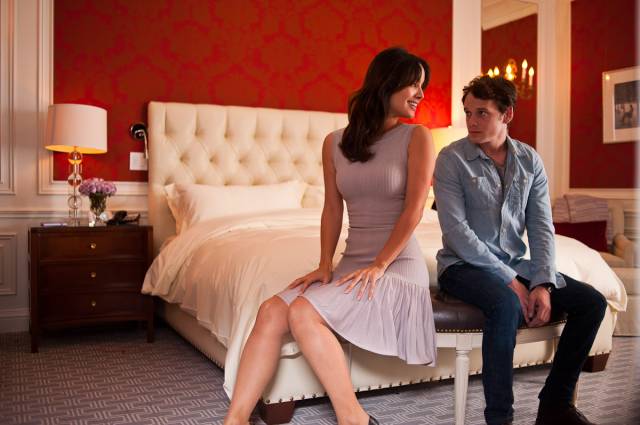
 5 to 7 is a charmingly, if somewhat outlandish, old-fashioned film where there’s nothing more romantic than lighting a woman’s cigarette, where infidelity is carried out with a Gallic debonair and understanding, and where social obligations are organized not with cell phones, but by meeting on the same stretch of sidewalk, week after week. This is the world our protagonist Brian Bloom (Anton Yelchin) happily enters when he meets Arielle (Bérénice Marlohe), an impossibly beautiful and elegant Frenchwoman nine years his senior, whom he has the luck to meet on the streets of New York. Brian is 24 years old and an aspiring writer, but he’s presented free of any Millenial signifiers – this is a fantasy version of New York City, where unemployed writers wear suits and live alone in Manhattan – he belongs much more to the lineage of earnest, young Americans encountering the French from midcentury films, such as Gene Kelly in An American in Paris.
5 to 7 is a charmingly, if somewhat outlandish, old-fashioned film where there’s nothing more romantic than lighting a woman’s cigarette, where infidelity is carried out with a Gallic debonair and understanding, and where social obligations are organized not with cell phones, but by meeting on the same stretch of sidewalk, week after week. This is the world our protagonist Brian Bloom (Anton Yelchin) happily enters when he meets Arielle (Bérénice Marlohe), an impossibly beautiful and elegant Frenchwoman nine years his senior, whom he has the luck to meet on the streets of New York. Brian is 24 years old and an aspiring writer, but he’s presented free of any Millenial signifiers – this is a fantasy version of New York City, where unemployed writers wear suits and live alone in Manhattan – he belongs much more to the lineage of earnest, young Americans encountering the French from midcentury films, such as Gene Kelly in An American in Paris.
As in that film, 5 to 7 portrays a cultural dynamic wherein the American is culturally naïve and eager to learn from the more established Europeans, but this film extends that dynamic into the characters' ages and personal development. Sparks fly immediately, the other shoe doesn’t drop until Brian learns that Arielle is married with children, and she will only meet within the hours of 5 to 7, the traditional time for extramarital affairs. Not only is she married, but happily married, to understanding diplomat Valery (Lambert Wilson). Brian at first thinks the arrangement is unethical, but eventually comes around and discovers its benefits. Arielle and Valery initiate him into a world of glamorous new acquaintances, including people like Valery’s lover Jane (Olivia Thirlby), a young editor who can help Brian’s career. But Brian soon falls even deeper in love with Arielle and chafes at the limitations of the relationship, forcing her to choose between him and the rest of her life.
5 to 7 is an utterly romantic film, not just because it’s a love story, but because it views the whole world through rose tinted glasses. Because of this, it’s as totally divorced from reality it its own way as the Marvel films are in theirs. It’s escapism for adults, or for the kind of people who find the Marvel films gauche, or would even use the word gauche. Among the more preposterous occurrences, Brian’s very first published story wins both a New Yorker award and an offer to publish a novel, and he is welcomed into Arielle’s family not only by her husband, but also by her eight-year old child. But as in more adolescent escapism, you have to accept the premise and move on, and by the end, 5 to 7’s total commitment to its nostalgic sense of romance has become endearing. Yelchin and Marlohe give this unlikely couple a believable chemistry, even if they seldom betray any inner turmoil, and they’re surrounded by a more than capable supporting cast (Frank Langella and Glenn Close elevate their clichéd suburban parent roles).
Brian is the kind of person who equates romance with old movies, anything French, or best of all, old French films (Jules and Jim is seen twice), and if you share those tastes or are interested in a romance where an older woman sweeps a younger man off his feet, 5 to 7 is for you.